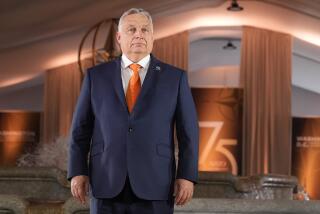Bush Reassures E. Europeans on Summit : East Bloc: He says the United States supports self-determination in the region and he and Gorbachev will not seek to dictate its future.
- Share via
WASHINGTON — President Bush assured East Europeans on Thursday that he and Soviet President Mikhail S. Gorbachev will not seek to dictate the future of the region through another Yalta-like agreement during their summit meeting next month in the Mediterranean.
After a White House meeting with the President, Imre Pozsgay, the leading candidate for president of Hungary and a reformer, said Bush “assured me no such agreement was being prepared to make over East Europe to the disadvantage of the countries there.
“Gorbachev has no profession of the sort either,” Pozsgay told an evening press conference at the Hungarian Embassy.
A senior Administration official later confirmed the essence of Pozsgay’s remarks, with one small exception.
The 55-year-old Hungarian politician, whose candidacy in national elections early next year will clearly benefit from the half-hour talk and photo session with the President, volunteered that Bush had asked him to pass on the reassurance publicly.
Pozsgay said he is aware of the debate in the United States over whether American and Soviet leaders should discuss the fragmenting Soviet empire in East Europe for fear it would appear that the superpowers were imposing a political settlement in the region, reviving memories of the Yalta agreement at the end of World War II that allowed those nations to become a buffer zone within the Soviet sphere.
Asked whether he had raised the issue, Pozsgay said that “the phrase Yalta II was not mentioned in the Oval Office.” But he then added that Bush “raised this matter” during their conversation, provided the assurance, “and he asked me to comment on it, which I am here doing.”
The senior U.S. official emphasized that “the word Yalta was never used.” Bush told the visitor that “naturally we support self-determination without interference from any quarter” in internal affairs of sovereign states, he said.
He denied that Bush suggested that Pozsgay repeat his remarks publicly.
“But otherwise, what he said is true,” the official added. “We have no problem with it.”
Regarding summit details, the White House confirmed that Bush plans to arrive in Malta on Friday, Dec. 1. He will visit Maltese officials shortly after landing but will spend his nights aboard U.S. naval vessels and leave immediately after the summit concludes Dec. 3.
Bush, in announcing the summit Tuesday, made clear that the turmoil in Eastern Europe would be a prime topic of discussion during his talks with Gorbachev.
His Administration has emphasized the importance of “peaceful change” and “stability” in those nations--East Germany, Poland, Czechoslovakia, Hungary, Romania, and Bulgaria--as Moscow lifts its grip.
Bush’s meeting with Pozsgay on Thursday, much as his appearance with Polish leader Wojciech Jaruzelski in Warsaw weeks before the Polish Parliament voted on the presidency, carried the irony of an American President appearing to endorse a lifelong Communist for the top job in his country as the best hope for nonviolent transition to a democratic society.
The Soviets, for their part, have said that East Europeans can find their own way economically and politically. But on security matters, there are conflicting statements from Moscow on whether these states could leave the Warsaw Pact for neutrality or even seek membership in the U.S.-backed North Atlantic Treaty Organization.
Most Soviet experts believe that U.S. efforts to lure one or more of those countries into a military pact against the Soviet Union undoubtedly would meet stiff Kremlin opposition.
More to Read
Sign up for Essential California
The most important California stories and recommendations in your inbox every morning.
You may occasionally receive promotional content from the Los Angeles Times.













